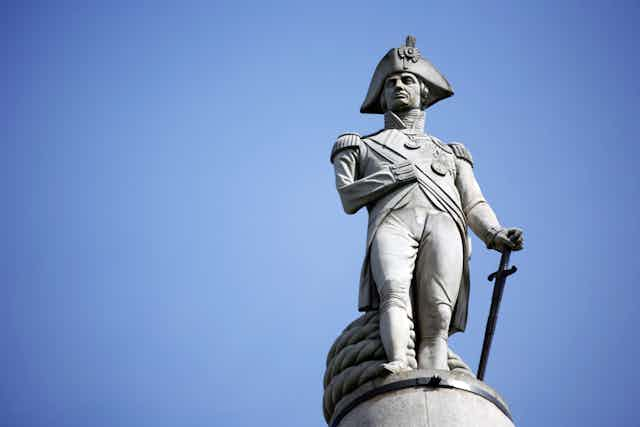Every year around this time, Britain’s Royal Navy hosts a dinner: there is good beef, fine port and chocolate ships are decked out with bunting and sparklers. October 21 2016 marks the 211th anniversary of the Battle of Trafalgar, fought between the Royal Navy and the combined navies of France and Spain.
Trafalgar was one of the most significant naval battles fought under sail, and the annual Trafalgar Night Dinner in London is a highlight of the Royal Navy’s social calendar, celebrating Admiral Lord Horatio Nelson and his famous victory.
But some common myths should be dispelled. While a crushing victory for the Royal Navy, Trafalgar was not the reason that the French emperor, Napoleon Bonaparte, gave up his plan to invade the British Isles. More decisive was his desire to browbeat Austria in 1805 combined with a naval action fought by Admiral Robert Calder on July 22 which had prevented Napoleon’s fleet from entering the English Channel.

In that sense, Trafalgar only reinforced an existing strategic situation. In the short term, what followed for Britain was a period of strategic isolation from Europe. Napoleon crushed Austria in 1805, Prussia in 1806 and forced Russia into peace talks (on Napoleon’s terms of course) in 1807.
In 1806, Britain and the French empire engaged in economic warfare which saw British trade largely excluded from European markets. Britain was politically and economically isolated at a time when fighting Napoleon was ever more expensive, with the cost of the war spiralling from £29m in 1804 to over £70m in 1813.
It was a sort of Brexit Mark I. The situation was bleak. What could British policy makers do?
Faced with a hostile Europe and an increasingly belligerent US legislating against trade with Britain, London looked to expand British trade and influence into other areas of the world. Key here were the untapped markets of the Portuguese and Spanish empires in South America.
Long thought of by Britons as a source of Spanish and Portuguese wealth since the profitable days of Sir Francis Drake in the 16th-century, Trafalgar gave Britain command of the sea and isolated those overseas colonies from their political masters in Madrid and Lisbon. They were ripe for exploitation, and based upon controlling maritime access to those markets, British exports to areas in the Americas outside of the US, valued at £7.8m in 1805, increased rapidly.
Crucially, the evacuation of the Portuguese royal family from Lisbon by the Royal Navy in December 1807 and its transportation with British warships to Brazil provided Britain with a friendly court dependent upon the Royal Navy for its continued existence. In just three years, British trade with Latin America had doubled to £16,590,000 in 1808. That compensated for the loss of trade with Europe and the US.
This did not provide ultimate victory for Britain, but it did keep her in the fight. Victory, in the sense of London achieving its war aims, would only come in the years 1814-1815, thanks to major changes in European relations following Napoleon’s attempted takeover of Spain in 1808 and, more importantly, his failed invasion of Russia in 1812 – in part prompted by domestic Russian displeasure at being denied British imports.
Britain responded with a commitment to Portugal and Spain of an army under the Duke of Wellington, as well as the generous funding of alliances that would finally topple Napoleon.
The price of war
Of course, it was Wellington’s victory at Waterloo on June 18 1815 which appeared to give Britain a greater voice at the Congress of Vienna to shape the post-war European situation to her benefit. But it was Britain’s economic position which, despite those spiralling war costs, allowed her to bankroll the European alliances of 1814 and 1815 to decisively defeat Napoleonic France.
Britain sent £60m in total to her allies during the Napoleonic Wars, just over £10m in 1814 and £8,649,725 in 1815. Crucial in this latter figure was £2m to Russia and £2,156,513 to Prussia. It was British money that kept the Prussians in the field to appear at Waterloo in timely fashion.
Britain’s position in 1815 as the world’s only superpower was based upon setting the rules of global trade. It was insured in London and carried in British ships – but her aims were only achieved by engagement with European politics.
So maybe Trafalgar was, after all, the most decisive naval battle ever fought for Britain. For while it took another ten years for peace to come, Trafalgar not only kept Britain solvent during a time of economic isolation from Europe, it allowed Britain to compensate for lost European trade until the time was right to re-engage politically and economically with Europe.

The struggles that lie ahead for the UK government are, of course, of a different nature to Trafalgar. Nevertheless, negotiating Brexit will be a lengthy and hard-fought process and once complete the UK’s future will still, inevitably, remain entwined with that of Europe.

